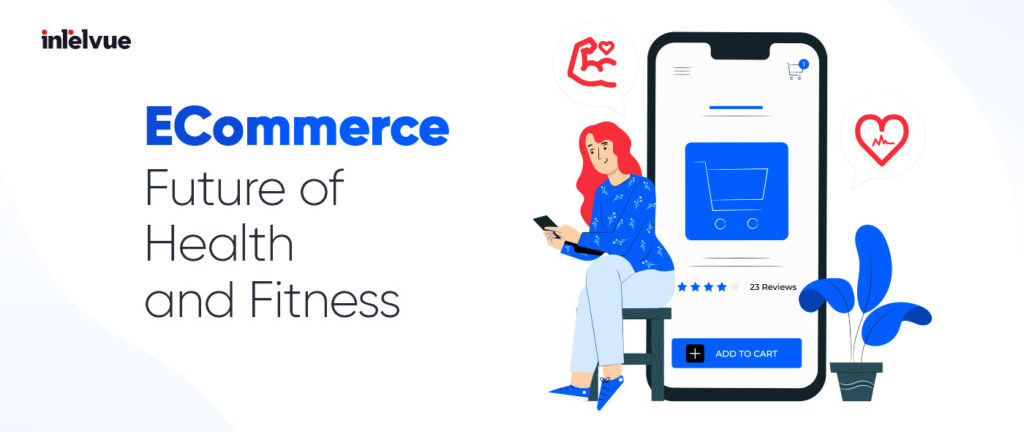
Health and Fitness Sectors will see a 23.3% increase in their online share of sales by 2025.
warc
Ecommerce is the future of health industry as well as of fitness sector.
E-commerce continues to grow, particularly with the development of the health and well-being sectors. These online businesses have become very lucrative. They attract young entrepreneurs who want to start an online business, which has a significant impact on the lives of consumers. ECommerce solutions are surging day by day as consumers are coming up with the transformed consumer’s behavior.
The search for a healthy lifestyle is at the heart of the concerns of the French. The latter is manifested in the plate, physical activity but also in leisure. It is therefore not surprising to see e-commerce explode in these areas.
Focus on Health, Food, and Recreation
With the increase in free time and the search for a healthy lifestyle, the sectors of well-being and health are developing very quickly on the web. We thus see online pharmacies, but also e-commerce websites selling organic and natural cosmetic products, as well as other dietetic products that are thriving on the web.
Just as the online stores that sell essential oils, hemp oil, or even food supplements are also growing speedily. They are conquering an ever-larger audience attracted by alternative and natural treatment methods. We are now seeking treatment through other means, which do not necessarily involve chemicals or drugs.
The challenges of the wellness sector
Faced with environmental issues and the problem of obesity, we see a parallel appearance of a clear interest in nutrition and “better eating”. Consumers now want fresh, organic, local products that respect good agricultural practices and have high nutritional value.
This trend explains the recent craze for superfoods such as spirulina, kale cabbage, and ginseng, but also for short-circuit consumption. In large French cities, there are more and more small shops and mini markets that offer products from local and organic agriculture.
Leisure is also directly impacted. Yoga, meditation, fitness, and even reiki videos abound on YouTube. Many companies are trying to attract new customers through these videos while subsequently monetizing nutrition programs.
The recipes developed by nutritionists, whether you are a flexitarian, vegan, vegetarian, or even a follower of the ketogenic diet, are exploding on the Internet. What about the sales of so-called natural food supplements to boost your immune system all these products turn into the real business through e-commerce sites.
Medical equipment and connected objects are on the rise.
Also, to the development of new drugs and treatments, the demand for medical technology is exploding, particularly via the Internet of Things (IoT). We can see the development of remote medicine in particular, but our smartphones, which record, inform, and alert, could also play a key role in the detection of specific pathologies.
We can also foresee a much more flourishing business in the health and well-being sector, via all the information collected on our connected products such as watches but also via smartphones.
Everything that monitors our health, our sleep, our physical activity, etc. becomes real exploitable data to better sell us the product or the service adapted to our condition.
Thus more and more medical mobile applications have emerged in recent years. They are intended for patients who wish to better manage their daily health. They also make it possible to facilitate the relationship between patients and healthcare professionals, but behind it is a much more lucrative business that seems to be taking place.
While these are relevant and interesting sources of information for patients, some offer to collect medical data and analyze it. This to provide advice to people with specific pathologies. We can see here a clear interest for patients who need follow-up or medical assistance for example.
This world of connected health will, therefore, become a very promising and explosive business in the years to come.
E-health connected applications and objects
The Novi-Check application, for example, helps young diabetics to better manage their disease daily. Mobile applications specializing in fitness sectors will show a remarkable surge in the future.
Connected health objects are also on the rise. It is the case with applications or technological gadgets that allow you to control your blood pressure, measure your blood sugar or heart rates, and count your daily number of steps.
Connected bracelets or mobile applications are often associated with a coaching offer to best achieve one’s goals. Connected scale, sleep sensor, pillbox, or smart blood pressure monitor are thus; emerging to help individuals better control their health.
The sale of devices dedicated to relaxation such as massage tables, essential oils and other massage tools have also increased.